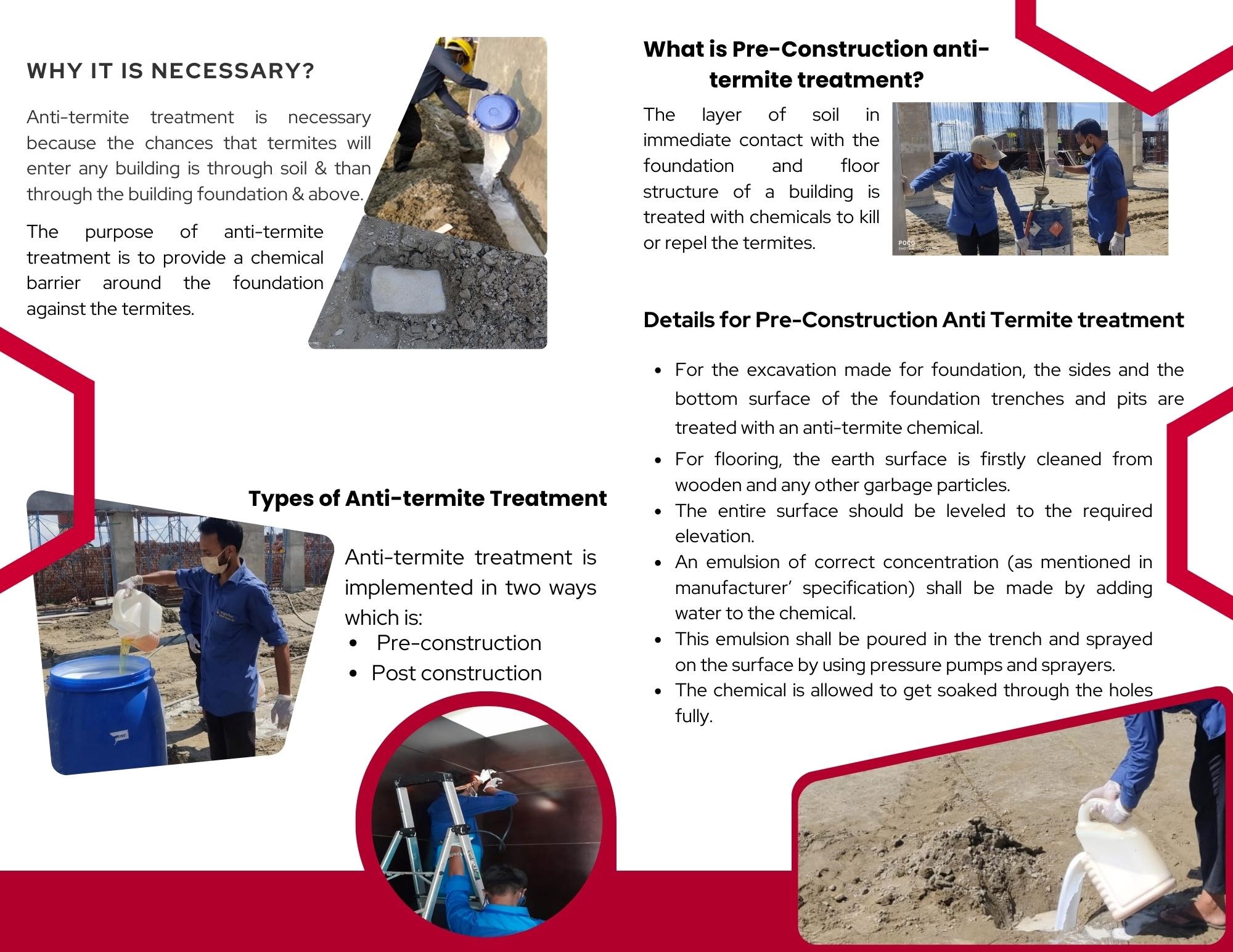Building owners face a crucial protection responsibility while building a foundation. As a property owner, don’t you seek the longevity and safety of your building? One of the most significant threats to the foundation of your building is termite infestation.
Therefore, anti-termite measures are crucial for protecting the foundation of a building, as termites can cause significant damage to wooden structures and even compromise the structural integrity of a building over time.
This article will discuss the importance of anti-termite pest control and how it can help protect your building foundation.
Impact of Termites on Building Foundation
Termites are tiny insects that feed on wood and cellulose-based materials. They are attracted to moisture and can enter your building through cracks in the foundation, walls, or roof. Once inside, they can cause significant damage to the foundation of your building by eating away at the wooden structures that support it. If left untreated, a termite infestation can weaken the foundation of your building and compromise its structural integrity.
Anti termite process:
Preventive Soil Treatment:
Before building construction, the soil around the foundation area is treated with termiticides. This treatment forms a chemical barrier that prevents termites from entering the structure from the ground.
This barrier acts as a deterrent, either killing termites on contact or deterring them from approaching the treated area.
Termite Barrier Systems:
Physical termite barrier systems are installed during construction. These may include plastic or metal barriers placed in the soil to prevent termites from reaching the foundation.
These barriers force termites to build visible mud tubes over the wall, making their presence more detectable during inspections.
Chemical Barriers:
Chemical solutions involve applying liquid termiticides to the soil around the foundation. These chemicals create a protective zone that termites cannot pass through without being affected.
This method is commonly used in both pre-construction and post-construction scenarios.
Anti termite spray
Anti-termite spray creates a protective barrier that prevents termites from entering and damaging your home. When sprayed in areas where termites are known to be a problem, the product’s active ingredients work to repel and kill termites on contact. Consequently, it eliminates existing termite colonies and prevents new ones from forming. It is important to follow the instructions on the label carefully to ensure that the product is used effectively.
Anti termite paint for wood
Anti-termite paint for wood contains chemicals that can repel or kill termites. When applied to wood, it creates a protective layer that prevents termites from coming into contact with the wood, thus inhibiting their ability to cause damage. As termites cannot penetrate the paint, they cannot feed on the wood, and their population decreases. Over time, the termites are eradicated, and the wood is protected from further infestation.
Baiting Systems:
Termite bait stations can be strategically placed around the property. These stations contain termite attractants and toxins. When termites consume the bait, they return the toxic substance to the colony, effectively controlling the termite population.
Regular Inspections:
Regular inspections by pest control professionals are essential for early detection of termite activity. Early intervention can prevent extensive damage.
Inspection and monitoring may involve checking for mud tubes, damaged wood, and other signs of termite presence.
Wood Treatment:
Wooden components of the building, especially those in direct contact with the ground, may be treated with wood preservatives or termiticides to deter termite infestations.
Awareness and Education:
Educating homeowners and construction professionals about termite prevention measures is crucial. Awareness helps implement preventive measures during construction and maintain vigilance against potential infestations.
Benefits of Anti-Termite Pest Control
Anti-termite pest control is a preventive measure that can help protect your building foundation from termite infestation. Applying chemicals to the soil around your building can create a barrier that termites cannot penetrate, preventing them from entering your building and causing damage.
Prevention of termite infestation:
Anti-termite pest control creates a barrier that prevents termites from entering your building, preventing an infestation from occurring.
Long-term protection of building foundation:
Anti-termite pest control is a long-term solution that can protect your building foundation for years.
Cost-effectiveness of anti-termite pest control:
Anti-termite pest control is more cost-effective than repairing the structural damage caused by termite infestation.
Choosing the Right Anti-Termite Pest Control
When choosing anti-termite pest control, you must work with a professional pest control company that can help you select the right solution for your building. Factors to consider when choosing anti-termite pest control include:
- The type of termites in your area.
- The size of your structure.
- The level of infestation.
Some types of anti-termite pest control include liquid termiticides, baiting systems, and physical barriers.
FAQ
How often should anti-termite pest control be performed to ensure maximum protection?
The frequency of anti-termite pest control treatment depends on various factors such as the type of building, location, soil type, and climate. However, it is generally recommended to have a termite inspection at least once a year and treat the building if necessary.
What are the signs that indicate the presence of termites in a building?
Some signs that may indicate the presence of termites in a building include mud tubes on walls, hollow-sounding wood, discarded wings, and frass (termite droppings).
What precautions should be taken during and after anti-termite pest control treatment?
During anti-termite pest control treatment, it is important to follow safety instructions provided by the service provider. After the treatment, precautions such as avoiding contact with treated areas and ensuring proper ventilation are recommended.
Can anti-termite pest control treatment be harmful to humans or pets?
Anti-termite pest control treatment can be harmful if not conducted properly. However, service providers use safe and effective methods to ensure the treatment is not harmful to humans or pets.
Wrapping up:
It’s important to note that the effectiveness of anti-termite measures depends on factors such as the type of termites present, soil conditions, and the thoroughness of the treatment. Regular inspections and, if necessary, reapplication of preventive measures are vital to ensuring long-term protection of the building foundation against termite damage.
By working with a professional anti termite pest control company and maintaining regular inspections and treatments, you can ensure the continued effectiveness of anti-termite pest control and protect your building foundation for years to come.






Leave A Comment